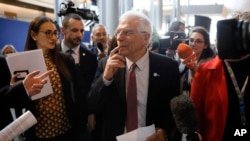Britain, France and Germany announced Tuesday that Iran's steps away from the 2015 nuclear agreement leave them no choice but to refer the situation to a dispute resolution process laid out in the deal.
The countries say they have upheld their responsibilities under the Joint Comprehensive Plan of Action, including lifting economic sanctions against Iran and working to promote legitimate trade with the country.
"However, in the meantime Iran has continued to break key restrictions set out in the JCPOA," they said in a joint statement. "Iran's actions are inconsistent with the provisions of the nuclear agreement and have increasingly severe and non-reversible proliferation implications."
The agreement, also signed by the United States, China and Russia, was meant to allay concerns Iran was working to build a nuclear weapon and put in place restrictions on its nuclear program that were meant to make such work impossible. In exchange, Iran got relief from sanctions that had badly hurt its economy.
But after the United States withdrew from the deal in 2018, Iran began reducing its compliance with steps such as going above the allowed limits on the amount of enriched uranium it can stockpile, enriching to higher levels, and using more centrifuges than allowed.
Iran implemented each measure in a series of steps, asserting each time that they were reversible if the other signatories worked with Iran, mainly to help it economically after the United States imposed new sanctions.
Iranian Foreign Minister Mohammad Javad Zarif said Monday the three European nations had "bowed to U.S. diktat" and that such an approach would never achieve anything.
"E3 can save JCPOA but not by appeasing the bully & pressuring the complying party," Zarif tweeted. "Rather it should muster the courage to fulfill its own obligations."
U.S. President Donald Trump's administration argued the deal was too generous to Iran and did not constrain what it called Iran's malign behavior in the Middle East. It has carried out what it calls a "maximum pressure" campaign to try to get Iran's leaders to alter their course.
Britain, France and Germany reiterated their "regret and concern" at the U.S. withdrawal from the agreement, and made clear in their statement Tuesday that seeking a resolution from the Joint Commission does not mean they are backing the U.S. strategy.
"Our three countries are not joining a campaign to implement maximum pressure against Iran," they said. "Our hope is to bring Iran back into full compliance with its commitments under the JCPOA."
The Joint Commission consists of one member from each of the signatories, and under the JCPOA they have 15 days to resolve a dispute. The step is the first in a series of potential resolution mechanisms, the last of which involves referring the matter to the U.N. Security Council.





